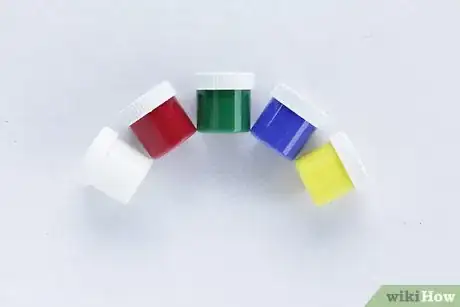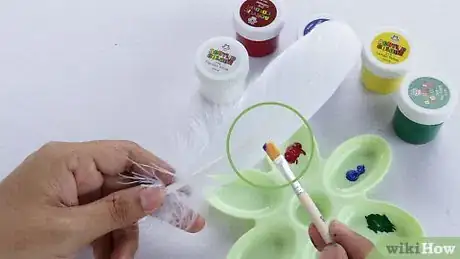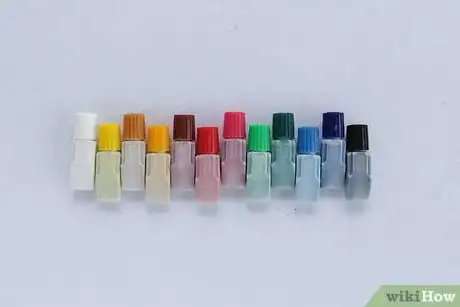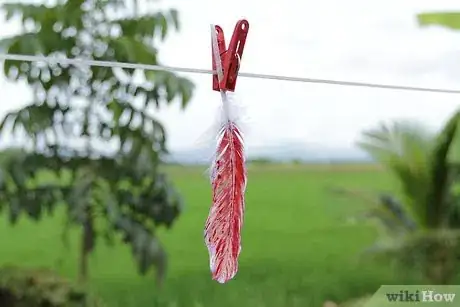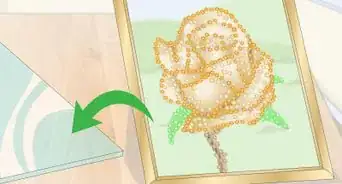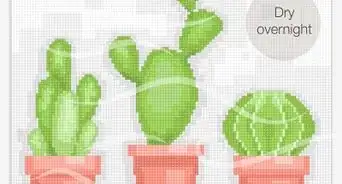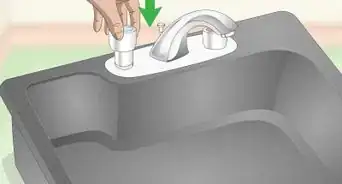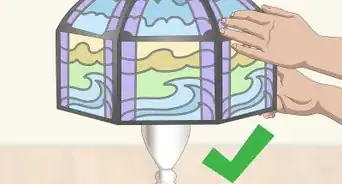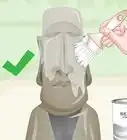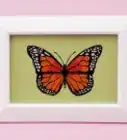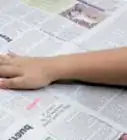This article was co-authored by wikiHow Staff. Our trained team of editors and researchers validate articles for accuracy and comprehensiveness. wikiHow's Content Management Team carefully monitors the work from our editorial staff to ensure that each article is backed by trusted research and meets our high quality standards.
The wikiHow Video Team also followed the article's instructions and verified that they work.
This article has been viewed 27,926 times.
Learn more...
Painting feathers is a fun and easy craft activity. They are fun to create and you will be left with a beautiful collection of feathers to display. You can choose to paint your feathers with watercolors or acrylic paint. Watercolor paints give a soft effect whereas acrylic paints allow you to create striking contrasting designs.
Steps
Painting Feathers Using Acrylic Paints
-
1Choose your paint colors. Put the tubes of paint beside each other to see which color combinations work best together.[1]
- Consider adding black or white paints as these can be added on top of your base colors to create a striking contrast.
-
2Squeeze a small amount of your selected paints onto a piece of card. Keep each color separate to stop the colors from merging. You will only need a small amount of each color.[2]
- Mix colours together on the piece of card if you want to create new colors. Mixing blue and red will make purple, red and yellow will make orange and red and white will make pink.
Advertisement -
3Load a medium-sized brush with a small amount of paint. Gently dip your brush into the first color of paint you want to use. Start with a small amount -- you can always add more if you need it, but using too much paint will make the feathers clump together.
-
4Brush gently across the feather in the direction that the feather grows. Painting in the direction of growth stops the brush from damaging or ruffling the feathers and helps to ensure you evenly coat the surface with paint. Use the paint sparingly, you only need a thin coat.[3]
- If you want to change colors, make sure you thoroughly clean your brush before using the next color.
-
5Turn the feather over and paint any patches you missed. Wait for the top coat of paint to try before turning the feathers over. This should take about 1 hour. You don't need to paint the entire back-side of the feather, only paint any patches that aren't colored. Try to match the colors so they mirror what is on the top of the feather. Avoid add unnecessary extra paint as this will make the feathers clump together.
- If the top coat of paint has soaked all the feathers you can skip this step.
- Let the feathers to dry for another hour before applying any more paint.
-
6Add designs onto your feather using black or white paint. Dip a very small paintbrush into your paint. Create any designs you like over your colored feather. You can experiment with lines, polka dots. and zig-zags. Get creative![4]
- Make sure the base layer of paint is completely dry before adding the black or white paint to stop the colors from merging together.[5]
-
7Leave the feathers to dry completely before displaying them. Keep the feathers in a warm place that is out of the wind until they are completely dry. Be creative with how you display your painted feathers. Try displaying them in a vase or attach them to a piece of card. [6]
- Make sure that the paint is dry before moving the feathers as the paint may stain other surfaces.
Painting Feathers Using Watercolour Paints
-
1Choose your colour scheme. If you want to use multiple colors try putting the tubes of paint beside each other so you can see if the colors look good together.
- If the colors on the tubes are darker than what you want, test them out on a spare piece of paper. Adding more water to the paint will make the color lighter. For example, change a deep-blue to a mid-blue by adding a few drops of water.
- Choosing a mixture of all light colors or all vibrant colors will give the feathers a cohesive look.
-
2Brush over the feather with a dry paintbrush to make them smooth. Use the tip of a brush to make the strands of the feather sit flat. This will give you a smooth surface to apply paint to and will help you to be able to paint all the strands of the feather.
-
3Squeeze a small amount of your selected paints into a paint palette. Keep each color separate to stop the colors from changing. Add a few drops of water to each of the colors.
- Keep adding water until you are satisfied with the color of the paint. For example, turn a dark-green to a mid-green by adding a few drops of water.
- If you don't have the color of paint that you want, try mixing the colors. Red and white will make pink, blue and yellow will make green and blue and red make purple.
-
4Paint your feathers using a watercolor brush. Dip the brush into the paint and brush the color across the feather. If the colours are too dark or aren't blending well, try adding more water to the paint. Paint each side of the feather in the direction that the feathers grow. This stops the brush from damaging or ruffling the feathers.
- Wash your brush after you have finished painting with one color. This will stop the colors from mixing on your brush.
- The water will absorb quickly into the feather so you only need to apply a thin coat of paint.
-
5Turn the feather over and paint any patches you have missed. Wait for the top coat of paint to try before turning the feathers over. This should take about 1 hour. You don't need to paint the entire back-side of the feather, only paint any patches that aren't colored.
- If you want the color to look evenly colored, try to match the colors so that they mirror the colors on top of the feather.
- Use a different colour if you want the feather to have a blended look.
-
6Leave the feathers to dry on a piece of paper. Choose a place out of the wind so the feathers don’t blow away. Make sure that the feathers are dry before moving them as the paint may stain other surfaces.
-
7Brush out the dry feathers with a small nail brush. Pull the brush over the feather in the direction that the fibers grow. Brush both sides of the feather to ensure that you catch all of the strands. This process will help to make the feathers fluffy again.
- Make sure that the feathers are completely dry before brushing otherwise they won’t fluff up.
Things You’ll Need
Painting Feathers Using Acrylic Paints
- Acrylic paints
- Paint brush (small and medium sizes)
- Cardboard
- Water to rinse the brushes
- Feathers
- Scrap paper
Painting Feathers Using Watercolour Paints
- Watercolor paints
- Paint brushes (medium-sized)
- Paint palette
- Water to rinse the brush
- Nail brush
- Feathers
- Scrap paper
References
About This Article
To paint feathers with acrylic paints, squeeze a small amount of your selected colors onto a piece of card. Next, load a medium-sized brush with a small amount of paint and brush the color gently across the feather in the direction of growth. Wait for the top coat of paint to dry before turning the feather over and painting any patches you missed. If you want to add designs, make sure the base layer of paint is completely dry, then use a very small paintbrush to brush the designs onto the feather. For tips on using watercolor paints on feathers, read on!
